
September 28
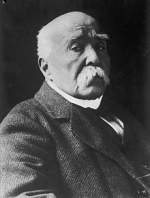
1841 Birth: Georges Clemenceau premier of France during World War I, will defend Alfred Dreyfus. [For further details, Click here.]
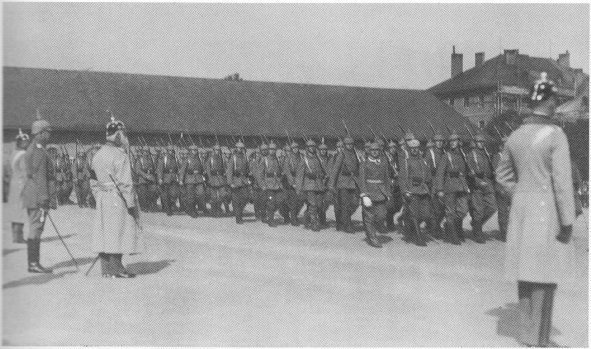
1914 World War I: List Regiment (Sep 1-Oct 7): Infantry recruit Adolf Hitler's regiment continues a short but intensive basic training program, which is held in the premises of a large public school on the Elizabeth Platz in Munich. Hitler receives the first uniform of his life; basic greenish-grey with an "RIR 16" sown in red unto the epaulettes and a red stripe down the side of the trousers. The trousers are tucked into new leather boots, topped by a thick leather belt around the waist of the uniform jacket. [For further details, Click here.]
Galicia: A general Austrian-German advance begins. Hindenburg moves to assist the defeated Austrians and prevent the Russian invasion of Silesia. Four German corps of the Eighth Army are transferred by rail to the vicinity of Krakow. [For further details, Click here.]
Click to Enlarge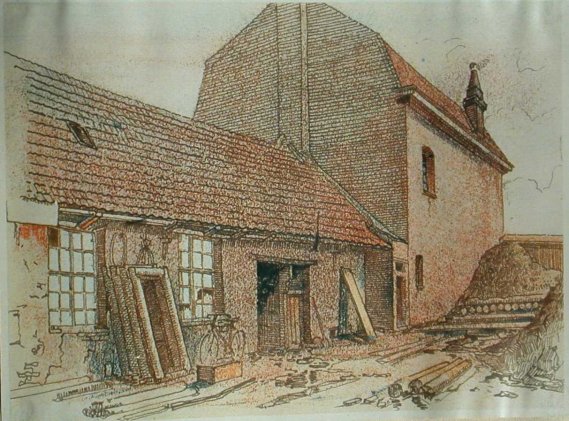
Fromelles Watercolor, 1915, by Hitler
1915 World War I: List Regiment: Gefreiter Adolf Hitler's 16 Reserve Infantry Regiment continues to occupy a position at Fromelles, on a level field with water channels, willow trees and willow stalks; in the distance towards the enemy lines lies an insignificant wood with barbed wire entanglements. Under the direction of their defense-minded commander, Lieutenant General Gustav Scanzoni von Lichtenfels, the regiment works ceaselessly day and night to further fortify their position at Fromelles while fighting off repeated assaults by the enemy. [For further details, Click here.]
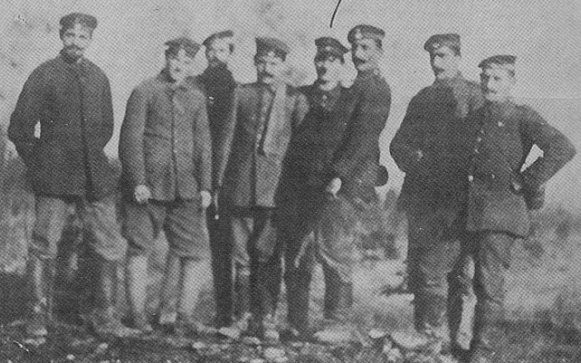
Hitler and his fellow dispatch runners
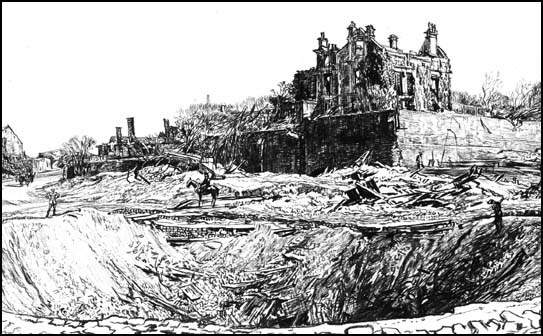
1917 World War I: List Regiment: (September 11-30): The regiment remains on light duty, guarding a camp near Mulhouse in Alsace, the only section of the front on German soil. During this slow time, not only will Hitler and his comrades get a well-deserved respite from the rigors of trench warfare, but the heavily censored news from the Front seems to be improving as well. The news of the collapse of the Russian Front and the further defeats of Italian arms is, however, tempered by the news that German munitions workers have gone on strike. This mix of events give an impression that the war on the Front is going well, but being undermined by defeatism on the home front. [For further details, Click here.]
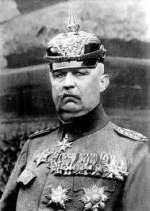 1918 World War I: Various:
1918 World War I: Various:
Armistice: General Ludendorff loses his nerve in a meeting with Hindenburg and demands an armistice "at once." (THP)
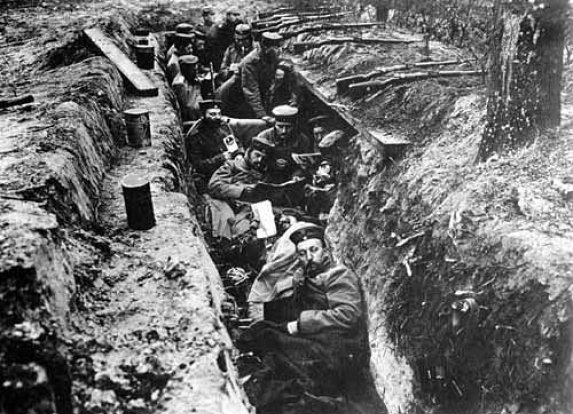
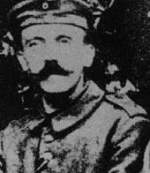
In an incident that would go down in the lore of World War I history--although the details of the event are still unclear--Private Henry Tandey, a British soldier serving near the French village of Marcoing, reportedly encounters a wounded German soldier and declines to shoot him, sparing the life of 29-year-old Lance Corporal Adolf Hitler . . . .
From July to October 1918, Tandey served with the 5th Duke of Wellington Regiment; it was during this time that he took part in the successful British capture of Marcoing, for which he earned a Victoria Cross for "conspicuous bravery." As Tandey later told sources, during the final moments of that battle, as the German troops were in retreat, a wounded German soldier entered Tandey's line of fire. "I took aim but couldn't shoot a wounded man," Tandey remembered, "so I let him go." The German soldier nodded in thanks, and disappeared.
Though sources do not exist to prove the exact whereabouts of Adolf Hitler on that day in 1918, an intriguing link emerged to suggest that he was in fact the soldier Tandey spared. A photograph that appeared in London newspapers of Tandey carrying a wounded soldier at Ypres in 1914 was later portrayed on canvas in a painting . . . . As the story goes, when British Prime Minister Neville Chamberlain traveled to Germany in 1938 to engage Hitler in a last-ditch effort to avoid another war in Europe, he was taken by the Fuehrer to his new country retreat in Bavaria. There, Hitler showed Chamberlain his copy of the Matania painting, commenting, "That's the man who nearly shot me."
The authenticity of the Tandey-Hitler encounter remains in dispute, though evidence does suggest that Hitler had a reproduction of the Matania painting as early as 1937--a strange acquisition for a man who had been furious and devastated by the German defeat at Allied hands in the Great War. [For further details, Click here.]
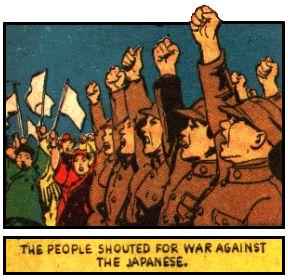
1931: Some 200,000 demonstrators in Peking demand a declaration of war on Japan.
[See: Countdown to Infamy: Timeline to Pearl Harbor.] 1939 World War II: Various:The Polish army surrenders:
Approximately 750,000 Poles have been taken prisoner-of-war by the Germans and the Soviets. The vast majority will never survive the war. The German-Soviet Friendship Treaty (below) is signed in order to regulate the Polish borders. Poland is in effect partitioned between Germany and the Soviet Union. During the fighting about 60,000 Polish soldiers have been killed, of whom some 6,000 are Jews. Note: While the city of Warsaw surrendered to the Germans, as did certain Polish commanders on the ground, Poland stands alone as the only nation defeated by Hitler that did not formally surrender. Instead, elements of the Polish government, as well as whole units of the Polish military, escape to France, and subsequently Britian, to continue the fight. [For further details, Click here.]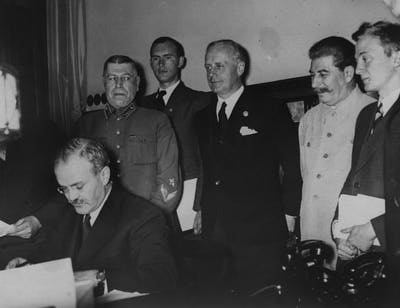
The Government of the German Reich and the Government of the USSR consider it as exclusively their task, after the collapse of the former Polish state, to re-establish peace and order in these territories and to assure to the peoples living there a peaceful life in keeping with their national character. To this end, they have agreed upon the following: Article I. The Government of the German Reich and the Government of the USSR determine as the boundary of their respective national interests in the territory of the former Polish state the line marked on the attached map, which shall be described in more detail in a supplementary protocol. Article II.
Both parties recognize the boundary of the respective nation interests established in article I as definitive and shall reject any interference of third powers in this settlement. Article III. The necessary reorganization of public administration will be effected in the areas west of the line specified in article I by the Government of the German Reich, in the areas east of this line by the Government of the USSR. Article IV. The Government of the German Reich and the Government of the USSR regard this settlement as a firm foundation for a progressive development of the friendly relations between their peoples. Article V. This treaty shall be ratified and the ratifications shall be exchanged in Berlin as soon as possible. The treaty becomes effective upon signature.
German-Soviet Boundary and Friendship Treaty, Secret Protocol:
The Government of the USSR shall place no obstacles in the way of Reich nationals and other persons of German descent residing in the territories under its jurisdiction, if they desire to migrate to Germany or to the territories under German jurisdiction. It agrees that such removals shall be carried out by agents of the Government of the Reich in cooperation with the competent local authorities and that the property rights of the emigrants shall be protected. A corresponding obligation is assumed by the Government of the German Reich in respect to the persons of Ukrainian or White Russian descent residing in the territories under its jurisdiction.
The undersigned plenipotentiaries, on concluding the German Russian Boundary and Friendship Treaty, have declared their agreement upon the following: Both parties will tolerate in their territories no Polish agitation which affects the territories of the other party. They will suppress in their territories all beginnings of such agitation and inform each other concerning suitable measures for this purpose.
German-Soviet Boundary and Friendship Treaty, Secret Supplementary Protocol:
The undersigned Plenipotentiaries declare the agreement of the Government of the German Reich and the Government of the USSR upon the following: The Secret Supplementary Protocol signed on August 23,1939, shall be amended in item to the effect that the territory of the Lithuanian State falls to the sphere of influence of the USSR, while, on the other hand, the province of Lublin and parts of the province of Warsaw fall to the sphere of influence of Germany (cf. the map attached to the Boundary and Friendship Treaty signed today). As soon as the Government of the USSR shall take special measures on Lithuanian territory to protect its interests, the present German-Lithuanian border, for the purpose of a natural and simple boundary delineation, shall be rectified in such a way that the Lithuanian territory situated to the southwest of the line marked on the attached map should fall to Germany. Further it is declared that the economic agreements now in force between Germany and Lithuania shall not be affected by the measures of the Soviet Union referred to above.
Declaration of the Government of the German Reich and the Government of the USSR:
After the Government of the German Reich and the Government of the USSR have, by means of the treaty signed today, definitively settled the problems arising from the collapse of the Polish state and have thereby created a sure foundation for a lasting peace in Eastern Europe, they mutually express their conviction that it would serve the true interest of all peoples to put an end to the state of war existing a present between Germany on the one side and England and France on the other. Both Governments will therefore direct their common efforts, jointly with other friendly powers if occasion arises, toward attaining this goal as soon as possible. Should, however, the efforts of the two Governments remain fruitless, this would demonstrate the fact that England and France are responsible for the continuation of the war, whereupon, in case of the continuation of the war, the Governments of Germany and of the USSR shall engage in mutual consultations with regard to necessary measures.
[See: Worst Dictator of Modern Times: Hitler or Stalin?]Reich Foreign Minister (Ribbentrop) to the Chairman of the Council of People's Commissars of the Soviet Union (Molotov):
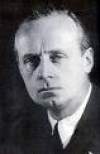
I have the honor to acknowledge receipt of your letter of today, in which you communicate to me the following: With reference to our conversations I have the honor to confirm herewith that the Government of the USSR is willing on the basis and in the sense of the general political understanding reached by us, to promote by all means the trade relations and the exchange of goods between Germany and the USSR. To this end an economic program will be drawn up by both parties, under which the Soviet Union will supply raw materials to Germany, for which Germany, in turn, will make compensation through delivery of manufactured goods over an extended period. Both parties shall frame this economic program in such a manner that the German-Soviet exchange of goods will again reach the highest volume attained in the past. Both Governments will at once issue the necessary directives for the implementation of the measures mentioned and arrange that the negotiations are begun and brought to a conclusion as soon as possible." In the name and by authority of the Government of the German Reich I am in accord with this communication and inform you that the Government of the German Reich in turn will take the necessary steps for this purpose. Accept, Mr. Chairman, the renewed assurance of my highest consideration.
Polish government-in-exile in France formed by Wladyslaw Raczkiewicz.
Lithuania annexes the Vilna region of Poland.
Agreement between Estonia and USSR, who thus gaining naval bases on the Baltic.
Church and Reich: Polish Cardinal August Hlond is allowed to broadcast a message to the Poles of the world over the Vatican Radio. The Pope, unhappy with the cardinal's presence in Rome, wants him to return to Poland, but the Germans will not allow it. (THP)
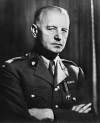
General Wladyslaw Sikorski is named to command the new Polish army forming in France.
Holocaust: An estimated 10,000 Polish Jews from Jaroslav are driven across the River San into Soviet occupied Poland. (THP)
1941 Various:
Holocaust: A curt notice, its text printed in Russian, Ukrainian and German, appears on buildings, tree trunks and fences in Kiev. It orders all Jews to report the following day to the old Jewish cemetery on the outskirts of town, not far from the railway station. The notice suggests that the Jews are going to be resettled. (THP)
Joseph Goebbels speaks on foreign press criticism:
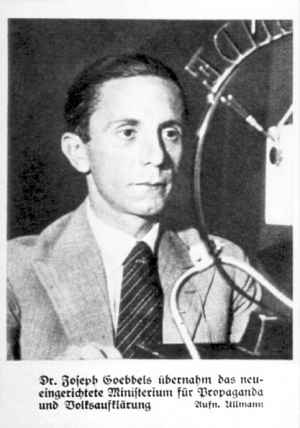
There are people unable to appreciate the scale of these military operations. They see things in the scale to which they are accustomed, using the standards with which they are familiar. Such people do not realize that a world battle without precedent is occurring. Bolshevism is using every available resource to resist annihilation. It is a matter of life or death. Only one of us will survive. One must consider what would have happened if the Fuehrer had not acted to deal with the Soviet danger. Only then can one understand what is at stake. Our soldiers are witnesses to Moscow's plans. They have seen with their own eyes the preparations made for the destruction first of Germany, then of Europe. They also have firsthand experience with the Soviet system, and can see the true conditions in the paradise of workers and farmers. This will have a major influence on the future. Just as there was no argument about the Jewish question in Germany after the Polish campaign, there will be no debate any longer about Bolshevism once the Eastern campaign is finished. This is more than a campaign or even a war. It is an historic battle with fate in the broadest sense of the word. [For further details, Click here.]
Greece: The short-lived Drama uprising against the Bulgarian occupationin northern Greece begins. [For further information, click here.]
1942: World War II: General Arnold fights for unique bombers:
Gen. Henry "Hap" Arnold gives highest priority to the development of two exceptional aircraft--the B-35 Flying Wing and the B-36 Peacemaker--intended for bombing runs from bases in the United States to targets in Europe.
General Arnold was a man of distinction from the beginning of his career: Not only was he one of the first pilots in the U.S. Signal Corps, he was taught to fly by none other than one of the Wright brothers. During World War I, Arnold was director of aviation training for the Army. Between the wars, he embraced a controversial military philosophy that emphasized strategic bombing, eliminating the need for the use of ground forces altogether. [For further details, Click here.]
1944 World War II: Various:
FDR to Churchill:

I have read with great interest your telegram from Field-Marshal Smuts, and I think we are all in agreement with him as to the necessity of having the USSR as a fully accepted and equal member of any association of great powers formed for the purpose of preventing international war. It should be possible to accomplish this by adjusting our differences through compromise by all the parties concerned, and this ought to tide things over for a few years until the child learns how to toddle.
Battle of Arnhem: Germans defeat British airborne at Arnhem, Netherlands.Its tactical objectives were to secure a series of bridges over the main rivers of the German-occupied Netherlands by large-scale use of airborne forces together with a rapid advance by armoured units along the connecting roads, for the strategic purpose of allowing an Allied crossing of the Rhine river, the last major natural barrier to an advance into Germany. The operation was initially successful with the capture of the Waal bridge at Nijmegen on 20 September, but was a failure overall as the final Rhine bridge at Arnhem was never taken, and the British 1st Airborne Division was destroyed in the ensuing combat. The Rhine would remain a barrier to the Allied advance until the Allied Offensives in March 1945. The defeat of Allied forces at Arnhem is considered the last major German victory of the Western Campaign. [For further details, Click here.]
Holocaust: Sep 28-29 4,000 Jews from Theresienstadt are sent to Auschwitz on two separate trains. Almost all are gassed, including all the old people and children. (THP)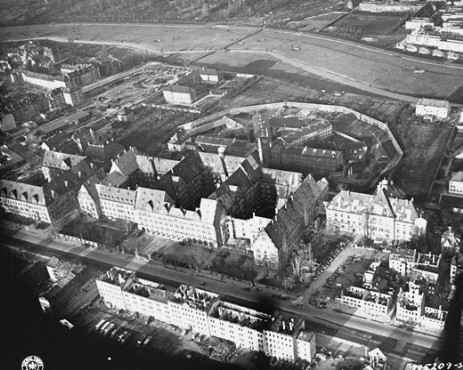
1946 Nuremberg Tribunal
: The justices continue to discuss verdicts in the Major War Criminals Trial. (See: 30 September 1946) 1955 Spandau Prison: From Spandau: The Secret Diaries, by Albert Speer:In the newspapers we see pictures of Raeder's first steps in freedom. Like Neurath when he was released, Raeder too seems entirely changed by his civilian dress and by his relaxed features. Curious, how one of us looks in freedom. But it isn't really all that exciting.
1959 Cold War: Khrushchev and Eisenhower offer views on summit meeting:
One day after concluding their summit meeting in Washington, D.C., Soviet leader Nikita Khrushchev and President Dwight D. Eisenhower offer their opinions as to the importance and meaning of their talks. Both men were optimistic that progress had been made in easing Cold War tensions. [For further details, Click here]

1960: I Aim at the Stars, a supposed biography of Hitler's former chief rocket scientists, Werner von Braun, has its official premiere at Loewe's Theater, in Washington, DC. It is written by Jay Dratler, based on a story by George Froeschel, H. W. John, and Udo Wolter; and directed by J. Lee Thompson. The film, whose original British release title is simply Wernher von Braun, will be picketed by angry Londoner's who still remember the V-2 attacks of the war. In Germany, where the film is titled Ich greife nach den Sternen (I reach for the Stars), moviegoers in Munich boo the production, especially when images of American rockets and missiles fill the screen. In Italy, the film is released as Alla Conquista dell' Infinito. The film has a very short and unimpressive showing everywhere. (Piszkiewicz)
[See: Wunderwaffen: Hitler's Deception and the History of Rocketry.]1966 Spandau Prison: From Spandau: The Secret Diaries, by Albert Speer (Two days before Speer's release):
In the evening I knocked on his [Hess's] cell door and asked to have a brief talk with him. I told him I thought it wrong to attempt to buy his release by simulating insanity. If he did that, I said, he would be undermining his own image, whereas now, thanks to his consistency, he was regarded with a certain respect even among his enemies. He would only destroy that if he played the madman. It would throw a bad light on his own bearing during the decades that lay behind him, make all that seem merely obsessive behavior. This, I said, was what I wanted to tell him honestly before I know longer could. For a while Hess looked at me wide-eyed, in silence; then he said firmly, "You are absolutely right. I too did not feel good about all that."
[See: Was Rudolf Hess 'Crazy'?]Edited by Levi Bookin (Copy editor) Click to join 3rdReichStudies Disclaimer: This site includes diverse and controversial materials--such as excerpts from the writings of racists and anti-Semites--so that its readers can learn the nature and extent of hate and anti-Semitic discourse. It is our sincere belief that only the informed citizen can prevail over the ignorance of Racialist "thought." Far from approving these writings, this site condemns racism in all of its forms and manifestations.
levi.bookin@gmail.com










Fair Use Notice: This site may contain copyrighted material the use of which has not always been specifically authorized by the copyright owner. We are making such material available in our efforts to advance understanding of historical, political, human rights, economic, democracy, scientific, environmental, and social justice issues, etc. We believe this constitutes a "fair use" of any such copyrighted material as provided for in section 107 of the US Copyright Law. In accordance with Title 17 U.S.C. Section 107, the material on this site is distributed without profit to those who have expressed a prior interest in receiving the included information for research and educational purposes. If you wish to use copyrighted material from this site for purposes of your own that go beyond 'fair use', you must obtain permission from the copyright owner.
Please Note: The list-owner and moderators of 3rdReichStudies are not responsible for, and do not necessarily approve of, the random ads placed on our pages by our web server. They are, unfortunately, the price one pays for a 'free' website.



